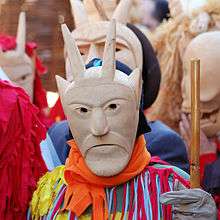Careto

The Careto tradition is a pre-historical Celtic religious ritual still practised in some regions of Portugal, namely in the villages of Podence (Macedo de Cavaleiros, Bragança District) and Lazarim (Lamego, Viseu District). It currently takes place during Carnival and is one of the oldest traditions being practiced in Portugal today.
Caretos are masked young men dressed in suits made of yellow, red, black, blue and green fringe wool quilts, wearing brass, leather or wooden masks and rattles in their belts.

Shrove Tuesday and the prior Sunday are the days when the Caretos are most active. They appear in groups from every corner of the village running and shouting excitedly, frightening the people and “robbing” all the wineries.
The main target of these masquerade groups are single young girls, who make them climb to the top of walls and verandas.
Scholars associate the Careto tradition with memories of magical practices related to agrarian fertility cults.[1]
References
- ↑ Carvalho Pereira, José Paulo. "Careto's Tradition". Careto's Tradition. www.azibo.org. Retrieved 2012-02-01.
External links
- Careto´s Tradition Article by José Paulo Carvalho Pereira in azibo.org, February 2006
- University of Louisville Department of Anthropology
- Carnival of Podence (in Portuguese)
- Endless energy of the Caretos (in Portuguese)
| Wikimedia Commons has media related to Carnival of Podence. |